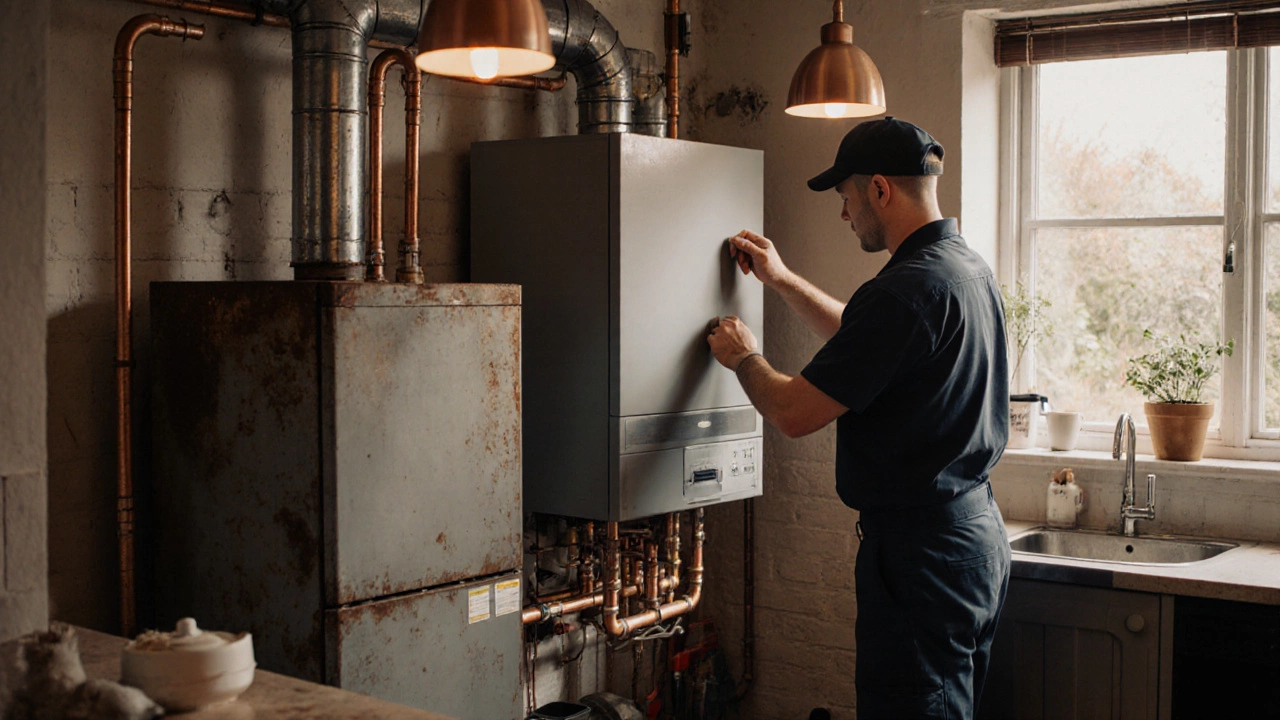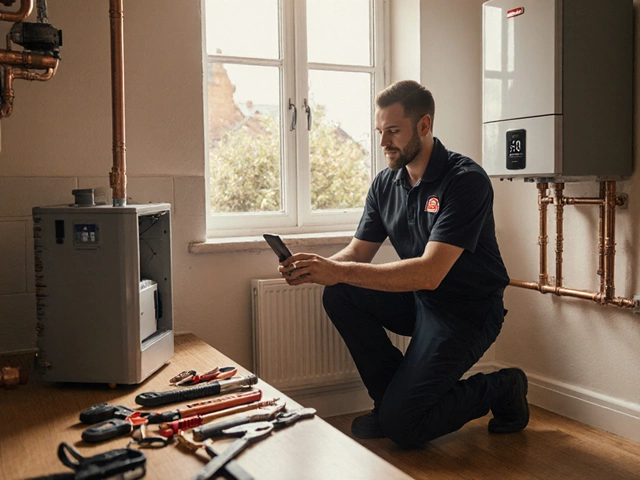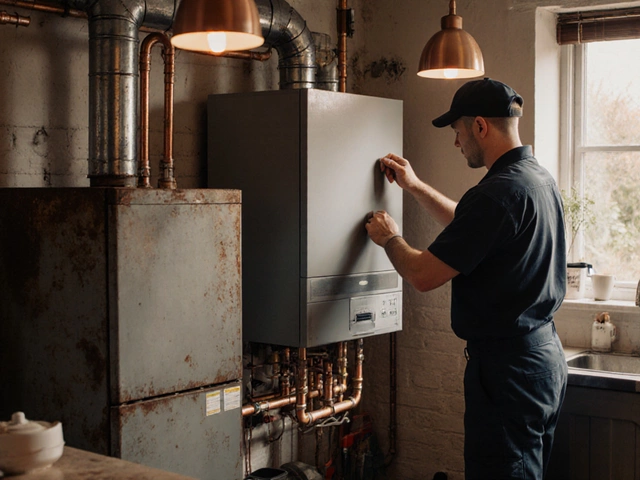Boiler Cost Estimator
Replacing a boiler isn’t just about fixing a broken appliance-it’s about keeping your home warm, saving money on bills, and avoiding emergency breakdowns in the middle of winter. If you’re asking how much does a new boiler cost, you’re not just looking for a number. You want to know what you’re actually paying for, what options exist, and how to avoid getting overcharged.
What’s Included in a Boiler Replacement Cost?
A boiler quote isn’t just the price of the machine. It’s the whole package: removal of the old unit, disposal fees, new pipework if needed, flue installation, controls, and labor. Many homeowners get surprised when they see a $4,000 quote and think they’re being ripped off-until they realize the old boiler was installed in 1998 and the gas line needs replacing.
On average, a new boiler installation in 2025 runs between $2,500 and $6,500 in the U.S. and Canada. But that range covers everything from a basic model in a simple setup to a high-end smart boiler in a complex old house. The key is understanding what drives the price up or down.
Boiler Types and Their Price Ranges
Not all boilers are the same. The type you choose affects both upfront cost and long-term efficiency. Here’s what you’re likely to see on the market today:
- Combi boilers - These are the most popular in homes under 2,500 sq ft. They heat water on demand and don’t need a tank. Prices: $2,000-$4,500 installed.
- System boilers - These work with a hot water cylinder and are better for larger homes with multiple bathrooms. Prices: $2,800-$5,500 installed.
- Regular (conventional) boilers - These need both a cold water tank and a hot water cylinder. Common in older homes but less efficient. Prices: $3,000-$6,500 installed.
- Condensing boilers - This isn’t a separate type-it’s a technology. Almost all new boilers sold today are condensing models. They’re 90%+ efficient and required by law in most places. Don’t pay extra for this-it’s standard now.
If you’re replacing a 20-year-old boiler, you’re almost certainly upgrading to a condensing combi boiler. That’s the sweet spot for most families: compact, efficient, and affordable.
What Adds to the Cost?
The boiler unit itself might be $1,200. But the real cost comes from what’s around it.
- Removal and disposal - Old boilers are heavy and full of rusted pipes. Most installers charge $150-$300 to haul it away and recycle it properly.
- Pipework upgrades - If your pipes are galvanized steel from the 1970s, they’ll need replacing with copper or PEX. That can add $500-$1,800 depending on how much is outdated.
- Flue relocation - If your new boiler can’t use the same flue as the old one (due to location or venting rules), you’ll pay $300-$1,000 to run a new one through the wall or roof.
- Smart controls - A basic thermostat adds $100-$200. A Wi-Fi-enabled thermostat like Nest or Ecobee adds $250-$500. Some installers bundle this in; others charge extra.
- Powerflush - If your system is full of sludge, a professional flush costs $300-$600. It’s not always required, but if your old boiler failed due to blockages, skipping this could kill the new one in a year.
One homeowner in Ohio paid $3,800 for a combi boiler replacement. The installers found 30 feet of corroded pipe under the basement floor. Replacing it added $1,100 to the bill. Without that discovery, they’d have had a breakdown again in six months.
Brand Differences: Do Expensive Brands Matter?
Boiler brands like Worcester Bosch, Vaillant, Baxi, and Navien all make reliable units. But price differences aren’t always about quality-they’re about warranty, service network, and marketing.
Worcester Bosch combi boilers often cost $500-$800 more than a comparable Navien or Viessmann. But here’s the catch: Worcester offers a 10-year warranty if installed by a certified technician. Navien gives 7 years. That’s a real difference if something fails in year 8.
For most people, a mid-tier model from a trusted brand is the smart pick. You don’t need the luxury features. You need reliability, good efficiency, and a solid warranty. Look for models with an A-rated energy efficiency label and at least a 7-year warranty.
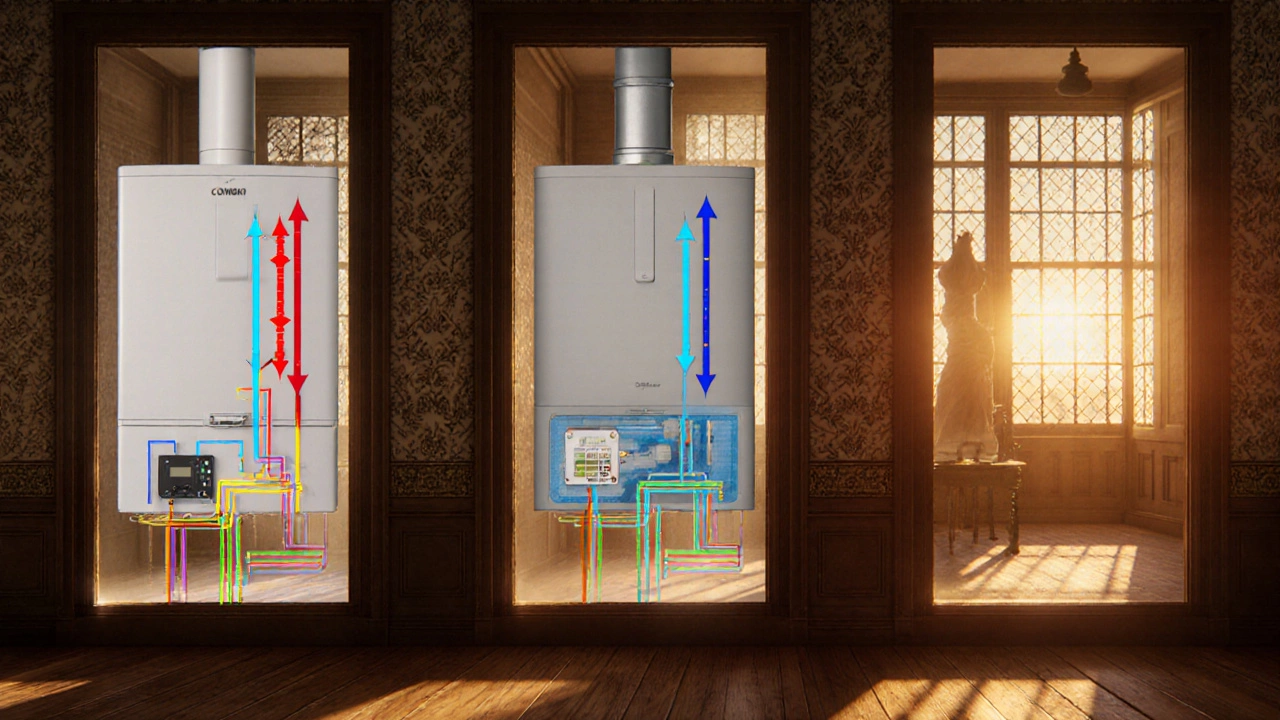
How to Avoid Being Overcharged
Boiler scams are real. Some companies show up after a storm or cold snap and charge $7,000 for a basic unit. Here’s how to protect yourself:
- Get at least three written quotes. Don’t accept verbal estimates.
- Ask for a breakdown: unit cost, labor, disposal, materials, permits.
- Check if the installer is licensed, insured, and certified by the manufacturer (like Gas Safe in the UK or NATE in the U.S.).
- Ask if the quote includes a system flush and pressure test. If not, add it.
- Never pay 100% upfront. A 50% deposit is standard. The rest is due after inspection and testing.
One couple in Michigan hired a company that quoted $5,200. Another company, recommended by a neighbor, quoted $3,900 for the same boiler model. The difference? The first company didn’t include removal of the old tankless unit. The second did-and had the same warranty.
Rebates and Financial Help
Thanks to the Inflation Reduction Act and state energy programs, many homeowners qualify for rebates on new boilers in 2025.
- The federal government offers up to $2,000 for high-efficiency boilers (above 95% AFUE).
- States like California, New York, and Massachusetts offer additional rebates of $500-$1,500.
- Some utility companies give $300-$700 just for switching from oil or electric heat to gas.
You don’t have to be rich to qualify. Most rebates are income-independent. Just ask your installer-they should know which ones apply. If they don’t, find someone who does.
When Should You Replace Your Boiler?
You don’t need to wait for it to die. Most boilers last 10-15 years. If yours is over 12 years old and you’re seeing:
- Strange noises (banging, gurgling)
- Increasing energy bills
- Water leaks around the unit
- Yellow flames instead of blue
- Requiring repairs more than once a year
It’s time to replace it. Waiting for a full breakdown means you’ll be without heat in winter-and you’ll pay more in emergency service fees. A $3,500 replacement in October is cheaper than a $5,000 emergency call in January.
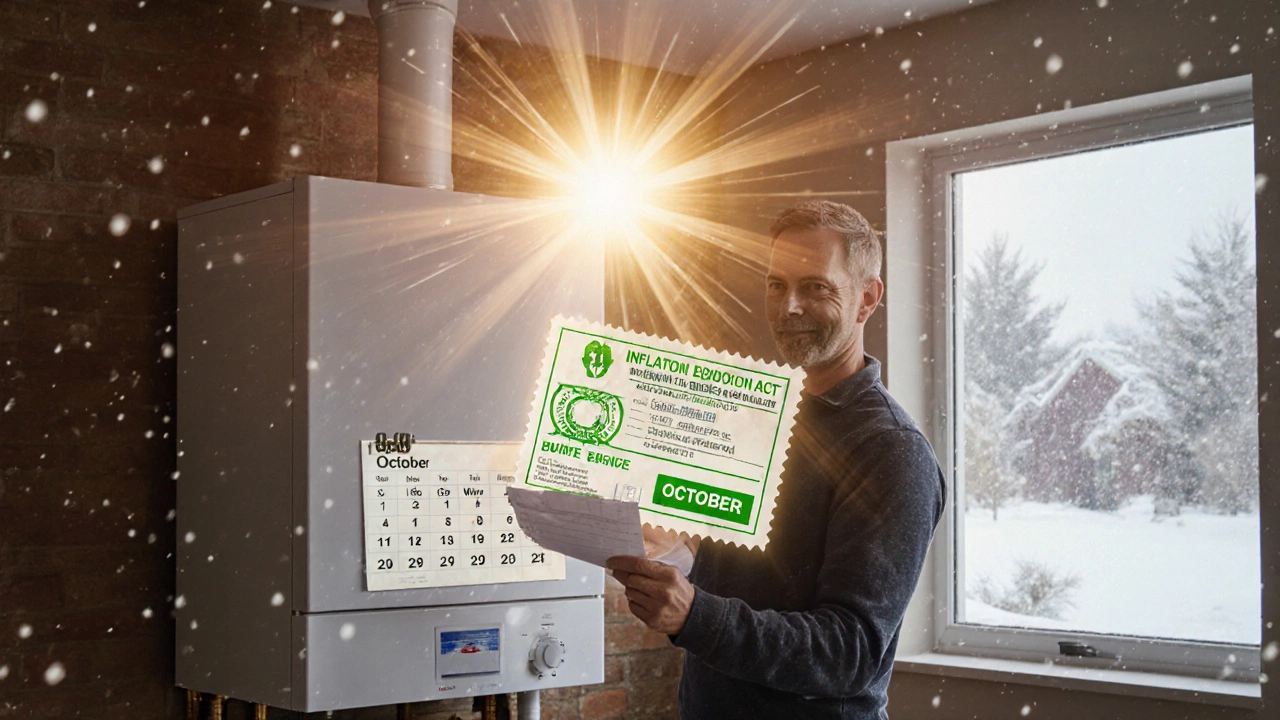
Installation Time and Disruption
Most boiler replacements take one day. If your home is simple-a single floor, no major pipe changes-you could be warm again by dinner.
Complex installations (multi-story homes, basement setups, flue rerouting) might take two days. Installers should clean up after themselves. If they leave pipes, tools, or dust everywhere, that’s a red flag.
Ask: “Will you protect my floors? Will you test the pressure? Will you show me how to use the new controls?” If they say “We’ll be done in six hours,” that’s a good sign. If they say “We’ll be here all day,” ask why.
What Happens to the Old Boiler?
Old boilers are 90% recyclable. Metal, copper, and plastic parts get separated and sent to recycling centers. Reputable installers will handle this legally and responsibly. Avoid companies that just leave the old unit on the curb-that’s illegal in many states and can leave you liable for improper disposal.
Ask for proof of disposal. A good installer will give you a receipt or certificate showing the unit was recycled.
How Long Will a New Boiler Last?
With proper maintenance, a modern boiler lasts 15-20 years. That’s not a guarantee-it’s a realistic expectation if you:
- Get an annual service from a certified technician
- Check the pressure yearly (should be between 1 and 1.5 bar)
- Flush the system every 5 years
- Replace filters if your model has them
One homeowner in Oregon replaced his boiler in 2018. He got the annual service done every fall. In 2024, it’s still running like new. His energy bills are 30% lower than before.
How much does a new boiler cost without installation?
The boiler unit alone costs between $1,000 and $3,500, depending on the brand and type. A basic combi boiler might be $1,200, while a premium system boiler could be $3,000. But remember: installation adds $1,500 to $4,000, so the total is what matters.
Is it cheaper to repair or replace a boiler?
If your boiler is over 10 years old and the repair costs more than $800, replacement is almost always cheaper in the long run. Repairs don’t fix efficiency loss, and old boilers are prone to more breakdowns. A $1,200 repair on a 14-year-old boiler means you’ll likely pay another $1,000 in six months. Replacing it now saves money and stress.
Can I install a boiler myself to save money?
No. Boiler installation requires gas line connections, pressure testing, flue compliance, and electrical hookups-all regulated by law in most areas. DIY installations are illegal, unsafe, and void your warranty. Even if you’re handy, the risk isn’t worth it. A $500 mistake could lead to a carbon monoxide leak.
Do I need a bigger boiler if I add a bathroom?
Not necessarily. Modern combi boilers are sized by heat output (measured in kW), not by the number of bathrooms. A 24-28 kW combi boiler can handle two bathrooms easily. If you’re adding a bathroom and your current boiler is under 20 kW, upgrading to 28-35 kW might help. But if your current system already struggles, you’re better off replacing it with a properly sized unit than just upgrading.
How do I know if my boiler is energy efficient?
Look for the SEDBUK or ErP label on the unit. In 2025, all new boilers must be at least 90% efficient (A-rated). If your boiler is older than 2010, it’s likely 70-80% efficient. Upgrading from an 80% to a 95% boiler can cut your heating bill by 15-25% annually.
Next Steps: What to Do Now
If you’re thinking about replacing your boiler, start by checking your current unit’s age. If it’s over 12 years old, start getting quotes. Don’t wait for winter. Call three certified installers. Ask for itemized quotes. Check for rebates in your area. And don’t be afraid to walk away from a quote that doesn’t make sense.
A new boiler is one of the smartest home upgrades you can make. It’s not just about comfort-it’s about safety, savings, and peace of mind. Get it right the first time, and it’ll serve you for nearly two decades.

